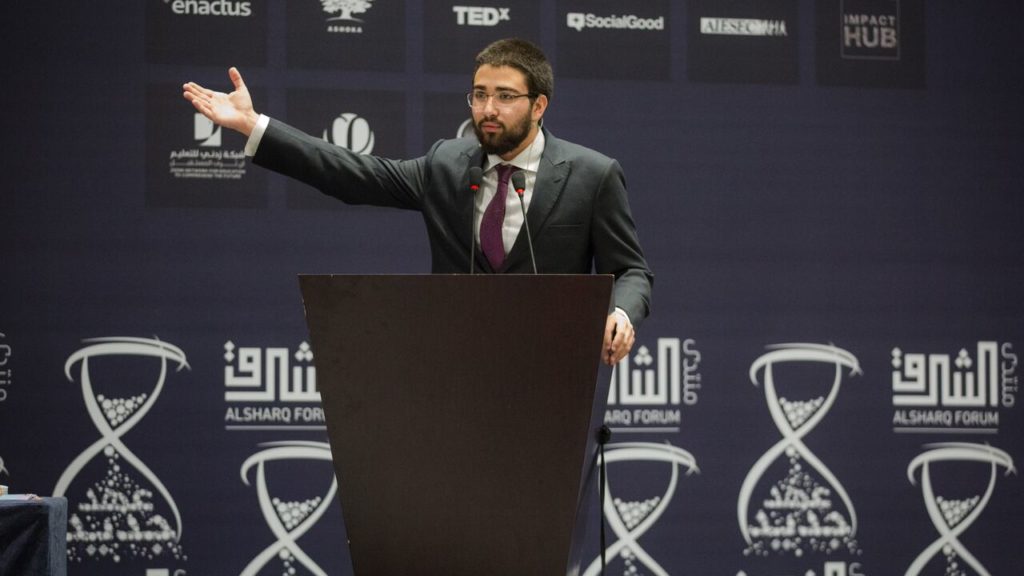Georgetown Thesis Leads to a United Nations Report on Education in Syria

Obada Khaled Diab graduated with honors from Georgetown University in Qatar in 2019 with a degree in International Economics. His commitment to volunteer and charity work, which began when he was just a boy, has taken him all over the world. But wherever he goes, he carries Damascus with him in his heart.
A native of Syria, Obada is also a U.S. citizen, and grew up in Qatar. Despite being an expatriate, Doha became his second home, thanks to the dedication and support of his family, who taught him the ethical principle of always giving back, in gratitude for how much he received. At the age of 13, he traveled to Pakistan on his first volunteer relief mission. The following year he traveled to the Kenya-Somalia border to help during a severe drought.. After that, he conducted relief and charity work in Syrian refugee camps in Turkey and Jordan.
At the age of 14, he gave a TEDxYouth talk held at GU-Q, where he talked about his experience in philanthropy and activism, calling on youth to take charge of their lives so that they can contribute positively to society. This early activism, engagement in GU-Q in high school and an interest in global economic issues brought him to Georgetown.
“In 2013, I joined the Georgetown Pre-college Summer (GPS) Program, which is designed to help prepare high school students for university life. This was an incentive to apply to GU-Q because I learned about the university’s teaching methods and the curriculum. Before that, I took part in GU-Q’s Model United Nations (MUN) as well as a Crisis Simulation exercise during secondary school,” said Obadah.
Prior to joining Georgetown in Qatar in 2014, he pursued an interest in Islamic economics. He spent a month at the International University of Islamic Finance in Malaysia, and took what he learned into his years at GU-Q, devoting his time and effort in Georgetown to pursue the goal of serving others in need, exemplifying the university’s value of “Women and Men for Others”.
“This was one of the most important values. I kept it in mind throughout my studies and hands-on training I did through organizations and agencies like Silatech and Reach out to Asia (ROTA) where I worked to provide jobs for Arab youth in the Arab world and in Asia. It also was a value I drew on as a member of the team selected to represent Qatar in the 2016 World Humanitarian Summit in Istanbul,” he said.
Obadah excelled in his studies and worked as a student representative in student government. Over time, the idea of focusing his volunteer work to alleviate the suffering and address the tragedies of his native Syria, began to crystalize. He had always linked his academic studies to home.
That decision became vivid during his work at the Sharq Forum for Youth, which helped expand his network around the world. He began to outline a dissertation thesis while spending half of his last academic year in Washington, D.C., before a personal health problem delayed his work, and graduation date.
“I was forced to stop studying for health reasons. Georgetown supported me, understood my circumstances, and stood by my side until I was ready to get back to work. This was the height of Georgetown’s contribution to my life,” he explained.
“Writing the thesis completely changed the course of my life, especially the academic side. I gained so many skills in the process, including writing, critical thinking, personal expression, and the ability to organize my thoughts and arrange my priorities…valuable tools that I will continue to use in the course of my career.”
The title of his thesis was “The Implications of Conflicts and Their Implications for Education: Evaluating the Effective Operation of Schools and the Cost of Welfare in Syria.”
“For my research, I contacted a non-governmental organization to obtain raw data and statistics on schools in Syria. From these statistics, my main question was to understand how the war affected schools, and how the presence of schools in different areas of influence affected their existence and operation.”
This research led him to take part in a United Nations activity in the Netherlands in the summer of 2018, developing a case study on emergency education, with a focus on Syria, a report which was subsequently published.
Today, Obadah says he seeks to work in the reconstruction of Syria and asks: “What can I do for needy people? I must work to return God’s grace given to me. Georgetown taught me the Jesuit values which are the same as Islamic and universal human values. These are linked to the nature of our lives, and despite their idealism, their role in our lived realities stems from the belief that goodness dwells in the future and therefore we must be optimistic about the future.”
Looking back over the past four years, Obadah sees a journey that he is proud of. He says that Georgetown gave him the opportunity to learn, experiment, search, make mistakes and learn from them. He was able to achieve so many of his goals, and get a step closer to many more.
For information on admission to GU-Q, visit>> https://www.qatar.georgetown.edu/admissions.